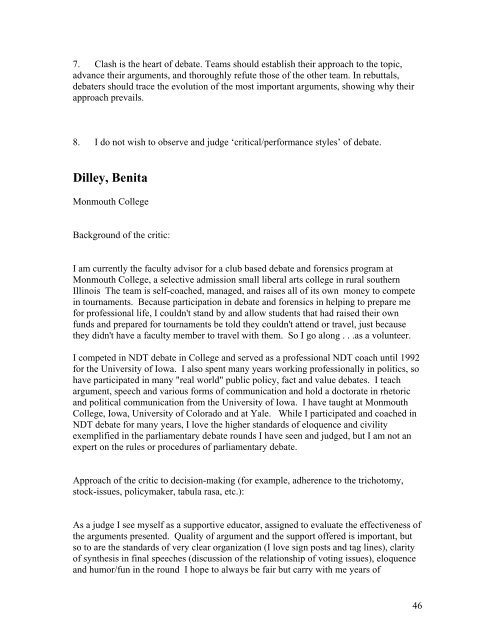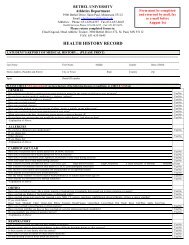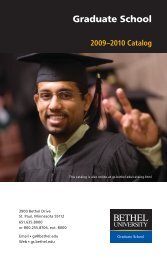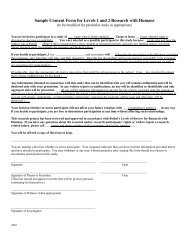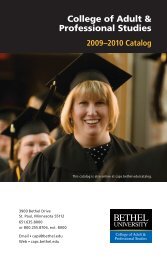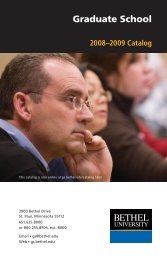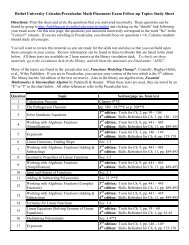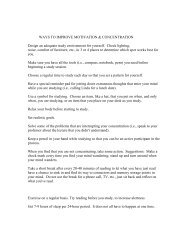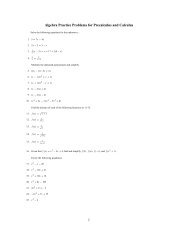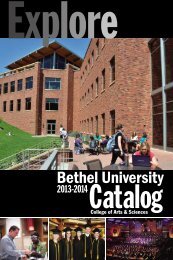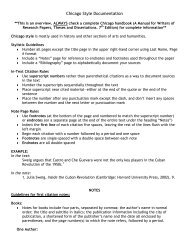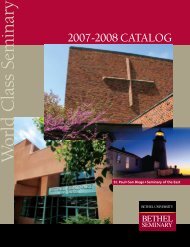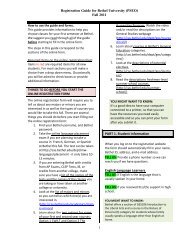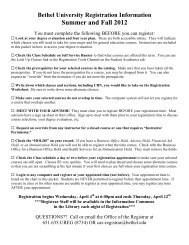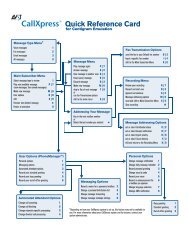here - College of Arts & Sciences - Bethel University
here - College of Arts & Sciences - Bethel University
here - College of Arts & Sciences - Bethel University
Create successful ePaper yourself
Turn your PDF publications into a flip-book with our unique Google optimized e-Paper software.
7. Clash is the heart <strong>of</strong> debate. Teams should establish their approach to the topic,<br />
advance their arguments, and thoroughly refute those <strong>of</strong> the other team. In rebuttals,<br />
debaters should trace the evolution <strong>of</strong> the most important arguments, showing why their<br />
approach prevails.<br />
8. I do not wish to observe and judge ‘critical/performance styles’ <strong>of</strong> debate.<br />
Dilley, Benita<br />
Monmouth <strong>College</strong><br />
Background <strong>of</strong> the critic:<br />
I am currently the faculty advisor for a club based debate and forensics program at<br />
Monmouth <strong>College</strong>, a selective admission small liberal arts college in rural southern<br />
Illinois The team is self-coached, managed, and raises all <strong>of</strong> its own money to compete<br />
in tournaments. Because participation in debate and forensics in helping to prepare me<br />
for pr<strong>of</strong>essional life, I couldn't stand by and allow students that had raised their own<br />
funds and prepared for tournaments be told they couldn't attend or travel, just because<br />
they didn't have a faculty member to travel with them. So I go along . . .as a volunteer.<br />
I competed in NDT debate in <strong>College</strong> and served as a pr<strong>of</strong>essional NDT coach until 1992<br />
for the <strong>University</strong> <strong>of</strong> Iowa. I also spent many years working pr<strong>of</strong>essionally in politics, so<br />
have participated in many "real world" public policy, fact and value debates. I teach<br />
argument, speech and various forms <strong>of</strong> communication and hold a doctorate in rhetoric<br />
and political communication from the <strong>University</strong> <strong>of</strong> Iowa. I have taught at Monmouth<br />
<strong>College</strong>, Iowa, <strong>University</strong> <strong>of</strong> Colorado and at Yale. While I participated and coached in<br />
NDT debate for many years, I love the higher standards <strong>of</strong> eloquence and civility<br />
exemplified in the parliamentary debate rounds I have seen and judged, but I am not an<br />
expert on the rules or procedures <strong>of</strong> parliamentary debate.<br />
Approach <strong>of</strong> the critic to decision-making (for example, ad<strong>here</strong>nce to the trichotomy,<br />
stock-issues, policymaker, tabula rasa, etc.):<br />
As a judge I see myself as a supportive educator, assigned to evaluate the effectiveness <strong>of</strong><br />
the arguments presented. Quality <strong>of</strong> argument and the support <strong>of</strong>fered is important, but<br />
so to are the standards <strong>of</strong> very clear organization (I love sign posts and tag lines), clarity<br />
<strong>of</strong> synthesis in final speeches (discussion <strong>of</strong> the relationship <strong>of</strong> voting issues), eloquence<br />
and humor/fun in the round I hope to always be fair but carry with me years <strong>of</strong><br />
46


